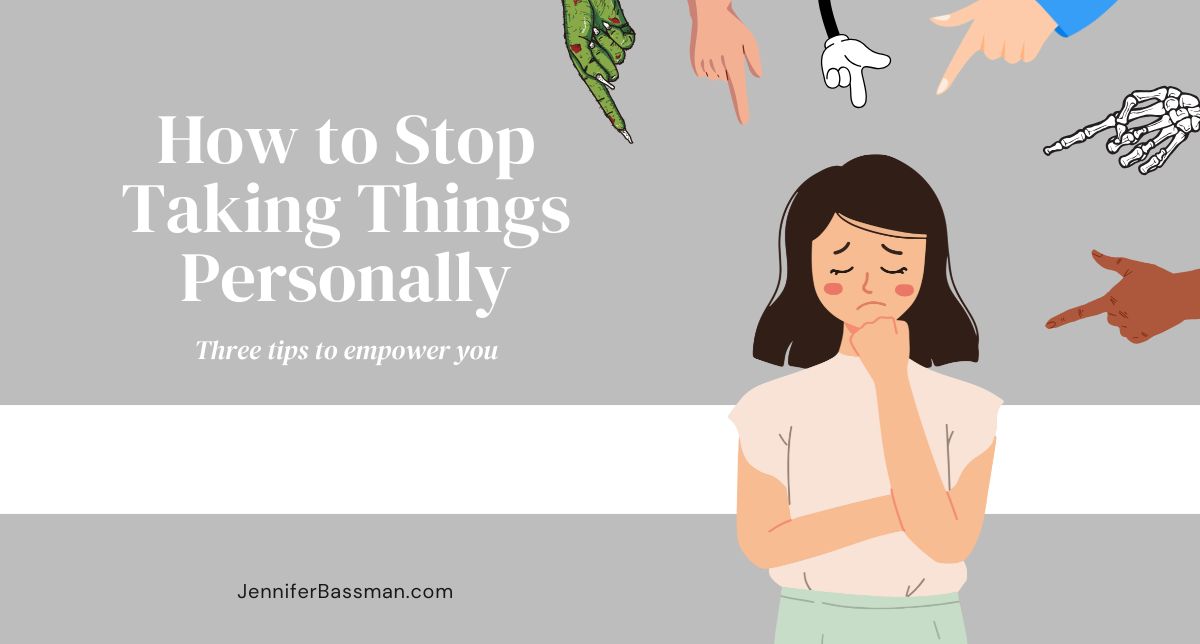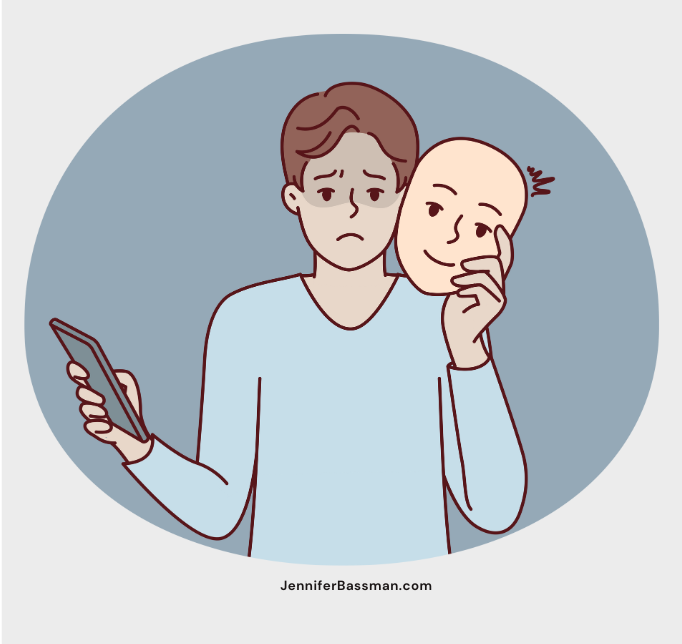Ah, the holidays! The most wonderful time of the year… unless Aunt Carol is about to critique your life choices, again. Or maybe Uncle Frank just turned the dinner table into his personal TED Talk on everything wrong with the world.
We’ve all been there. Someone says something wildly unnecessary, and suddenly you’re spiraling—rethinking your entire existence.
But what if I told you… you don’t have to take it personally?
Learning how to handle stressful family gatherings. Download by clicking here to get your Ultimate Family Gathering Survival Guide.
Why Do You Take Things Personally?
Humans want to feel seen and cared for. We enjoy compliments and acknowledgement of our hard work. But we fear being alone, invisible, or not offering anything of worth. Even if you are someone who doesn’t particularly love attention – you still desire some.
We take things personally for a variety of reasons, but the most common being it keeps a connection with someone.
When another person expresses some sort of strong emotion toward you, you feel like you haven’t disappeared. On some level, even if the attention is negative, or you are in a place where you’re not feeling particularly valued or connected with others, finding offense keeps you in a heated connection with others.
Your psyche or subconscious translates this to mean, “Conflict means I matter immensely to that person.”
Your unconscious mind is aware of your needs – even if you’re not. So, it’s trying to meet those needs of feeling cared about or feeling acknowledged.
Tip #1: Understand It’s About Them, Not You
Listen, when Aunt Carol says, “Oh, still single? I was married at your age,” that’s not about you. That’s about Carol needing to justify her 1982 Vegas elopement. Then, her quick divorce.
People’s comments often reflect their insecurities, not your reality.
Often, when someone is saying something cruel, those words are more about them reflecting some internal conflict with themselves, externally and out in the open.
Make yourself very aware of the fact that most other people are only thinking about how to meet their own needs. So, most of what people hate or take issue with, in relation to us, has a lot more to do with them than with us.
The best way for you to deal with this is to opt out of those underlying belief systems that your worthiness, or sense of being good enough, depends on how other people think of you. And remember, that people meet their own needs by taking their internal conflict about their own self-worth and direct it to an external audience.
So, next time someone drops a passive-aggressive gem, pause and remind yourself: their words are a mirror, not a judgment.
Tip #2: Set Boundaries Like a Boss
The holidays are for good vibes, not unsolicited life critiques.
Boundaries aren’t rude — they’re self-awareness and self-care with a bow on top. And if someone doesn’t respect them? Well, that’s their problem, not yours. You’re too busy thriving over here.
Look, you know your family and what to expect. Instead of playing defense, waiting until someone says or does something that offends or hurts you, decide ahead of time how you are going to respond.
Create boundaries before something happens, so you don’t have the opportunity to internalize the negativity or even interact with it in the first place.
If someone’s going too far, it’s okay to say, “I’d rather not talk about that,” or “Pass the potatoes, please!” while strategically ignoring their comment. If this person doesn’t stop, it’s okay to leave the room and remove yourself from the situation.
If any of these boundary solutions offend the other person, or other relatives seem to want to quash the discomfort with pleas for your return, remember this is selfish behavior on their part. They want to keep you in an unpleasant situation, so they don’t have to confront the real issue.
Gone are the days where, “But we’re family!” is an acceptable response to someone intentionally inflicting pain.
Tip #3: Reframe and Focus on the Fun
Finally, let’s not forget the main event: having fun. The holidays are about cozy vibes, delicious food, and questionable karaoke sessions.
Don’t let one snide comment have so much power over you that it ruins the magic. Redirect your energy to what really matters — like crushing your cousin at board games or eating an obscene amount of pie.
You can do this by reframing what is said and done around you.
If you are recognizing true disrespect, your job is to respect yourself enough to disconnect from the situation. Say to yourself or aloud, “I’m not fine with you talking to me that way or treating me that way.” Then, draw a boundary here.
Instead, what we often do is fixate on trying to change someone else’s behavior, attitude, or force an apology.
Which only keeps the negative cycle spinning and we end up even more upset.
What if, when the disrespectful comment or action happens, you focus on cutting off the negativity in your own head? You refuse to give it energy or validation.
For example, Uncle Frank makes some disparaging remarks as part of his dinnertime TED Talk. Typically, you might comment or fight back in an attempt to prove him wrong or help him see the error in his thinking.
In this case, instead of getting involved in a heated discussion, you reframe the situation in your head. Remember in Tip #1 we talked about how often insults and back-handed compliments are more about the other person than something you are actually doing? Same applies here.
Uncle Frank’s TED Talk is him bringing an internal conflict, some unhappiness he has with his own life, out into the open for all to hear about. Since his thoughts have nothing to do with you, turn your attention elsewhere and refocus on someone else.
Reframe the moment as boring and not meant for you. Start a conversation with a relative sitting next to you, excuse yourself for a bathroom break, or pull out your phone and start reading something that interests you.
Do something fun and that brings you joy – like eating dessert first.
Don’t Make Someone’s Bad Behavior About You
If there was one thing my mom was right about, it’s that its not worth it to lower yourself to another’s level. Let them stew in their own stink.
To stop taking things personally requires you to be honest with yourself about your own thoughts and behavior. When you allow another person’s negativity to take root in your mind, you’ve given them a lot of undeserved power over you.
The most important thing you can do is remind yourself that you are a strong, confident person. You don’t have to take crap from anyone – especially your family.
Adjust your goals and expectations to keep you from being disappointed. People aren’t going to change over a turkey and pumpkin pie. It’s not even the time to attempt to do so. But, if you go into a situation prepared with tools like boundaries and reframing, you set yourself up for more fun and better memories.






